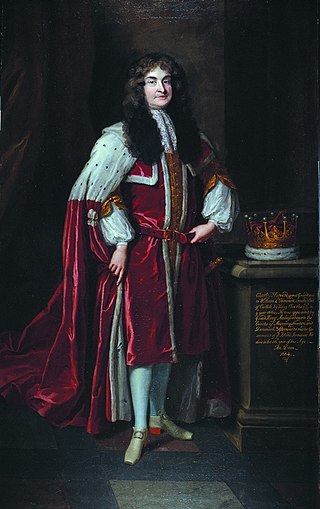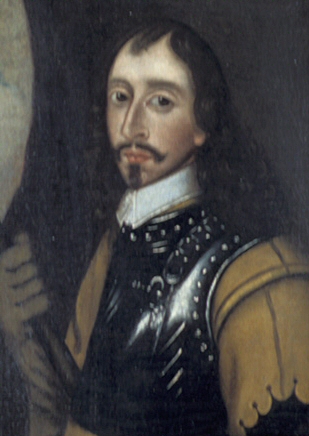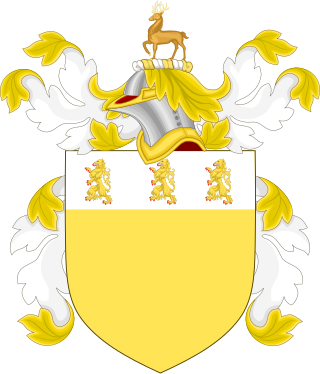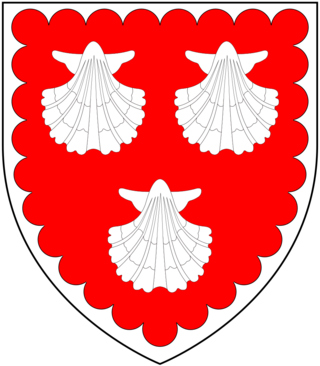
Charles Howard, 1st Earl of Carlisle was an English military leader and politician who sat in the House of Commons at various times between 1653 and 1660 and was created Earl of Carlisle in 1661.

Nathaniel Fiennes was a younger son of the Puritan nobleman and politician, William Fiennes, 1st Viscount Saye and Sele. He sat in the House of Commons at various times between 1640 and 1659, and served with the Parliamentarian army in the First English Civil War. In 1643, he was dismissed from the army for alleged incompetence after surrendering Bristol and sentenced to death before being pardoned. Exonerated in 1645, he actively supported Oliver Cromwell during The Protectorate, being Lord Keeper of the Great Seal from 1655 to 1659.

Sir Hardress Waller, was an English Protestant who settled in Ireland and fought for Parliament in the Wars of the Three Kingdoms. A leading member of the radical element within the New Model Army, he signed the death warrant for the Execution of Charles I in 1649; after the Stuart Restoration in 1660, he was condemned to death as a regicide, a sentence commuted to life imprisonment.

Colonel John Hewson, also spelt Hughson, was a shoemaker from London and religious Independent who fought for Parliament and the Commonwealth in the Wars of the Three Kingdoms, reaching the rank of colonel. Considered one of Oliver Cromwell's most reliable supporters within the New Model Army, his unit played a prominent part in Pride's Purge of December 1648. Hewson signed the death warrant for the Execution of Charles I in January 1649, for which he reportedly sourced the headsman, while soldiers from his regiment provided security.

George Booth, 1st Baron Delamer, was an English landowner and politician from Cheshire, who served as an MP from 1646 to 1661, when he was elevated to the House of Lords as Baron Delamer.
Colonel Sir Richard Ingoldsby was an English officer in the New Model Army during the English Civil War and a politician who sat in the House of Commons variously between 1647 and 1685. As a Commissioner (Judge) at the trial of King Charles I, he signed the king's death warrant but was one of the few regicides to be pardoned.

Sir Edward Rossiter was an English landowner, soldier and politician from Lincolnshire. He fought with the Parliamentarian army in the Wars of the Three Kingdoms and sat as an MP at various times between 1646 and 1660.

Sir Edward Massey, also spelt Massie, was an English soldier and politician from Cheshire, who sat in the House of Commons at various times between 1646 and 1674. He fought for Parliament in the First English Civil War, when he became famous for his defence of Gloucester. Although he remained loyal during the 1648 Second English Civil War, Massey switched sides following the Execution of Charles I in January 1649, and served under his son Charles II during the Anglo-Scottish war (1650–1652). Badly wounded at Worcester in September 1651, he was captured but managed to escape, and rejoin the exiled Stuart court in the Dutch Republic.

Philip Sidney, 3rd Earl of Leicester was an English politician who sat in the House of Commons at various times between 1640 and 1659 and became Earl of Leicester in 1677. He supported the Parliamentarian cause in the Wars of the Three Kingdoms, when he was known as Viscount Lisle, a subsidiary title of the Earls of Leicester.

Sir Job Charlton, 1st Baronet KS was an English judge and politician who sat in the House of Commons between 1659 and 1679. He was Speaker of the House of Commons of England briefly in 1673.
Richard Salwey was an English politician who sat in the House of Commons variously between 1645 and 1659. He was a republican in politics and fought on the Parliamentary side in the English Civil War.

Sir John Lisle was an English lawyer and politician who sat in the House of Commons at various times between 1640 and 1659. He supported the Parliamentarian cause in the English Civil War and was one of the regicides of King Charles I of England. He was assassinated by an agent of the crown while in exile in Switzerland.

Sir Walter Erle or Earle was an English landowner and politician who sat in the House of Commons at various times between 1614 and 1648. He was a vigorous opponent of King Charles I in the Parliamentary cause both before and during the English Civil War.

Colonel Nathaniel Rich was a member of the landed gentry from Essex, who sided with Parliament during the Wars of the Three Kingdoms and was "an example of those pious Puritan gentlemen who were inspired by the ideals of the English Revolution". Appointed a colonel in the New Model Army in 1645, then elected MP for Cirencester in 1648, he was a close associate of Oliver Cromwell until the two fell out due to his association with the Fifth Monarchists, a radical religious group that opposed the latter's appointment as Lord Protector in 1653.
Sir William Wray, 1st Baronet, of Ashby was an English politician who sat in the House of Commons at various times between 1645 and 1660.
Sir Thomas Barnardiston, 1st Baronet was an English baronet, landowner, soldier and MP who sat in the House of Commons at various times between 1640 and 1659. He fought on the Parliamentary side in the English Civil War.
Thomas Pury was an English politician who sat in the House of Commons variously between 1640 and 1659. He fought on the Parliamentarian side in the English Civil War.
Robert Scawen (1602–1670) was an English politician who sat in the House of Commons at various times between 1640 and 1670. He supported the Parliamentary cause in the English Civil War.

Christopher Clapham (1608–1686) of Beamsley near Skipton in Yorkshire, England, was a politician who sat in the House of Commons in 1659 and 1660.

Sir Theophilus Jones, was an Irish soldier and government official of Welsh descent. One of five sons born to Lewis Jones, Bishop of Killaloe in the Church of Ireland, he formed part of a close-knit and powerful Protestant family.














